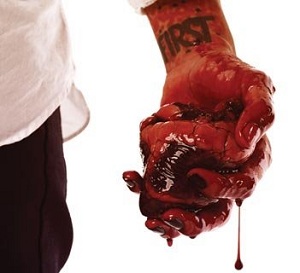Once when asked for a brief definition of a good karate person, Nagamine Shōshin (1907-1997) quoted: Kisshu busshin 鬼手佛心: A demon’s hand, a saint’s heart.
Note: Kisshu busshin is the Sino-Japanese reading of the Kanji. In native Japanese reading it is spelled „Oni te, hotoke kokoro“.
Nagamine was a very erudite person. Since he quoted this saying, it became a venerated dictum among karate practitioners. Not only are there dōjō in Okinawa that use it as a motto, but it is also frequently quoted in overseas dōjō.
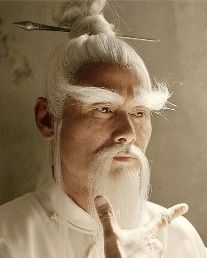
Master Peng says: “Ripping out hearts is my hobby. It’s good for you!”
Although a specialist area, in karate rarely a compulsory defined terminology – or nomenclature – is found. For this reason and except the very technical terms, many sayings and concepts in karate are simply at the hands of everyone‘s free interpretation. This being so, everyone will have a personal interpretation of this saying, differing more or less from others.
In case of such callygraphy-shortcut-style sayings like Kisshu busshin, the biggest problem is that it doesn’t follow proper grammar. We just don’t know: Does it refer to “a person who has a demon’s hand and a saint’s heart”? Or does it refer to “do something with a demon’s hand, but in a saint’s heart”?
Or whatever else you may come up with.
Whether intentionally or not: the very writing style of Kisshu busshin forces you to start a zen-like contemplation on the possible intended meaning. That’s why it is so easy and tempting to attribute various meanings to it.
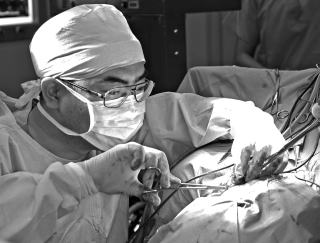
Surgical intervention necessitates seeming brutal means.
But Kisshu busshin originally was not karate jargon. Rather, it has been borrowed from an already existing, yet rarely used jargon. So we find definitions for Kisshu busshin in various dictionaries.[1] According to these dictionaries, the lexical meaning of Kisshu busshin is defined as an expression used by doctors, in particular by surgeons: During surgery, surgeons cut open the body of a patient. But even though the surgeon performs seemingly cruel things with his hands, he does so in a compassionate heart and to save the patient.
In other words, from its outward appearence the surgeon‘s act appears like brutal means being taken: the devil’s hand. On the very inside, however, the surgeon is filled with benevolence for the patient, trying to save him; that is, the Buddha’s mind. According to this, and from the perspective of medical jargon, Kisshu busshin can be interpreted like this:
“The means as severe as that of the devil, but the heart as warm as that of the Buddha.”
Kisshu busshin – as such – is originally a figurative saying in the meaning of:
“Killing evil by doing evil, but for a good intention.”
It’s like the cure for a malady that necessitates some unusually harsh or brutal means:
- vaccination,
- pulling a sick tooth
- cutting open a patient to remove diseased tissue,
- screwing together a fractured bone,
- the use of chemotherapy …
The demon’s hand is necessary to bring relief or to save the patient from the situation getting worse.
Karate may be defined as a martial art for self-defense. Considering it from this perspective, Kisshu busshin might be interpreted something like this:
“Always be compassionate and peaceful like a Buddha. But when forced to defend yourself, destroy as unmerciful as a devil.”
or
“Practicing deadly techniques while maintaining the spirit of humanity.”
Karate may also be defined as a martial art for training the body. Considering it from this perspective, Kisshu busshin might be interpreted something like this:
“Practicing as hard as a devil but having compassion for those who can‘t.”
Karate may also be defined as a martial art for self-improvement. In Nagamine’s “Ethics of the dōjō” we find the very first requirement to be: “First OF ALL purify your mind”. Considering it from this perspective, Kisshu busshin might be interpreted something like this:
“Train like the devil to reach the spirit of the Buddha.”
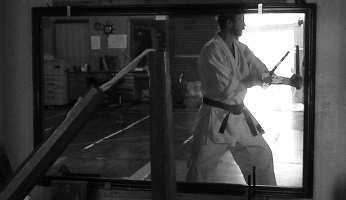
The author A. Quast practicing inside Nagamine dojo in Naha Kumoji, February 2008.
Unifying the above train of thought, I personally tend to interpret Nagamine’s intention for describing a “good karate person” by the expression Kisshu busshin as thus:
“By using the austere practice of karate as a tool, you act as your own surgeon, self-removing YOUR OWN moral diseases. In this way, by removing the evil within, you finally serve the spirit of humanity.”
In the end the interpretation remains a question of preference. It depends on what you consider a desease. And it depends of whether you consider yourself as venerable as the example of Buddha. It is much too easy to consider oneself “good” and others “bad”. So it is in your own responsibility how you interpret Kisshu busshin. Otherwise you might become the devil instead of the Buddha… So first of all purify YOUR mind.
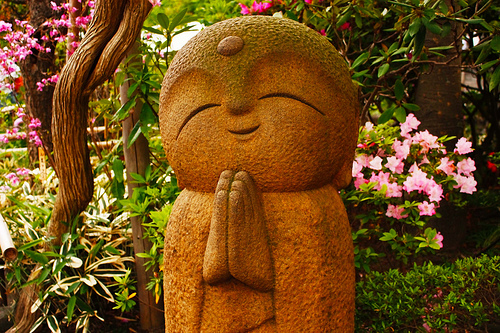
A happy buddha.
[1] For example, the Jitsuyō Nihongo Hyōgen Jiten 実用日本語表現辞典, the Daijirin 大辞林 (a Japanese monolingual dictionary published by Sanseidō), and the Sekai Shūkyō Yōgo Daijiten 世界宗教用語大事典.
© 2015 – 2023, Andreas Quast. All rights reserved.

